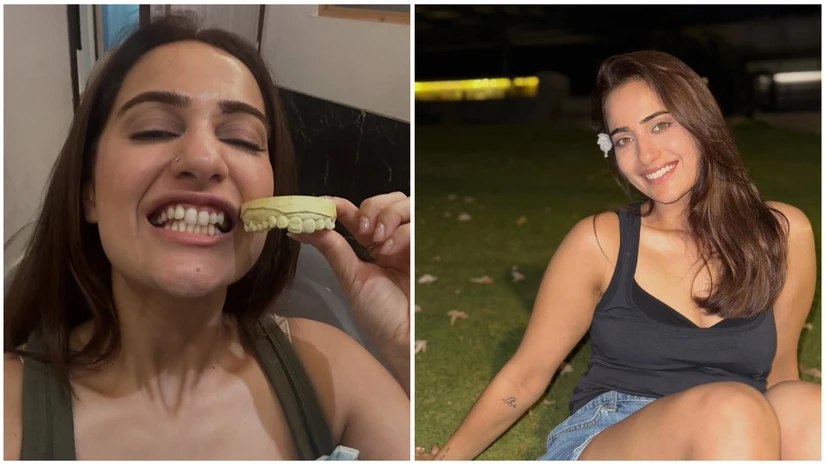Traditional metal braces that some of us were forced to wear in high school were never fun. Between the wires, food restrictions, and awkward grins in photos, while many accepted their fate, others just chose to live with imperfect teeth. But now, invisible aligners—a sleek new way to straighten teeth—have taken over urban India. From Instagram influencers to young professionals, everyone’s hopping on this clear-tray trend. Recently, content creator and internet icon Kusha Kapila revealed she is on an invisible aligner journey, and soon her changed smile had everyone talking.
How do clear aligners straighten your teeth?
Invisible aligners are clear, removable trays that straighten teeth without metal braces. They use custom-made orthodontic moulds to fit snugly over your teeth and gradually shift them into alignment. They are typically worn for 20–22 hours a day and removed only for eating, drinking (except water), brushing, and flossing. They need to be changed every 1 week to 10 days, depending on the programme, to progress the treatment.
Technology behind invisible braces: CAD, 3D scans and more
According to California-based Align Technology, which manufactures Invisalign clear aligners, the tech used includes 3D scans, computer-aided design (CAD), computer-aided manufacturing (CAM), and thermoformed plastic trays.
What materials are used in invisible aligners?
The materials vary by brand but generally include:
Also Read
- Medical-grade thermoplastic polymers for strength and flexibility
- SmartTrack material (Invisalign) for controlled tooth movements
- BPA-free polyurethane resins (ClearCorrect)
- ClearQuartz (ClearCorrect), offering improved elasticity and force consistency
Why are invisible braces becoming popular in India?
- Aesthetic preference: Millennials and professionals want straight teeth without visible braces
- Digital access: Teledentistry and apps make it easier to track progress
- Health and confidence trends: A perfect smile is now part of wellness culture
- Celebrity endorsements: Influencers and actors are marketing clear aligners
- Convenience: Fewer clinic visits and minimal lifestyle disruption
Which invisible aligner brands are available in India?
Invisalign: ₹1.5 lakh – ₹3.5 lakh (available via orthodontists, Clove Dental)
Toothsi/makeO: ₹50,000 – ₹90,000, home scans, D2C model
Illusion Aligners: ₹40,000 – ₹1.2 lakh, 3D tech, global certifications
Clove Dental: ₹49,999 onwards, includes both Invisalign and in-house aligners
32 Watts Clear Aligners: ₹40,000 – ₹1 lakh, app tracking
Flash Aligners: In-clinic only, strong presence in smaller cities
How to get started with invisible aligners in India
Option A: Direct-to-consumer (D2C) like Toothsi/makeO
- Book free home scan or impression kit
- Receive a 3D smile preview
- Approve treatment, pay (EMI available)
- Get aligners delivered home
- Monitor via app or dentist check-ins
Option B: In-clinic route (e.g., Invisalign, Clove Dental)
- Visit certified orthodontist
- Get 3D scans and customised treatment
- Receive aligners and attend regular follow-ups
What are the pros and cons of invisible aligners?
Pros:
- Virtually invisible
- Removable during meals
- No wires or brackets
- Fewer dentist visits
- Comfortable and custom-fit
Cons:
- Must wear ~22 hrs/day
- Not suitable for complex dental issues
- Costlier than metal braces in some cases
Are clear aligners worth the cost and hype?
According to Clove Dental, invisible aligners are a great fit if aesthetics and comfort are priorities. They’re especially suitable for influencers, working professionals, and anyone seeking discreet orthodontic treatment. However, they’re not a substitute for traditional braces in complex orthodontic cases. For more health updates and wellness insights, follow #HealthWithBS

)